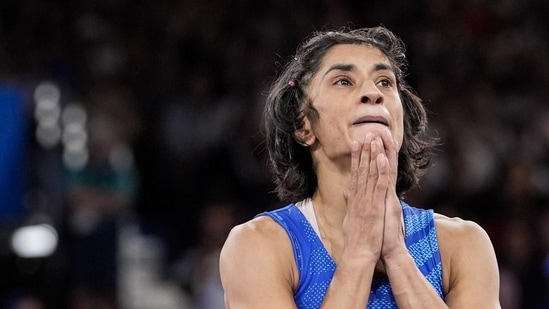[ad_1]
Although India ended their campaign at the Paris Olympics on Saturday with six medals – one silver and five bronze – the nation has kept their fingers crossed on a seventh, which could see the contingent match their best-ever medal-tally feat achieved in the Tokyo Games, as they eagerly await the decision from the Court of Arbitration or Sports (CAS), where Vinesh Phogat appealed for a silver medal. The Indian wrestler was disqualified ahead of her gold-medal bout on Wednesday in women’s 50kg freestyle for being 100 grams overweight in the morning weigh-in.

The Indian Olympic Association (IOA) has filed an appeal to challenge United World Wrestling (UWW) and the International Olympic Committee’s (IOC) decision. Vinesh virtually attended the hearing on Friday, which lasted close to three hours, where senior advocates Harish Salve and Vidushpat Singhania presented her side of the argument. Dr. Annabelle Bennett AC SC (Australia) is the sole arbitrator for this case.
What did Vinesh Phogat’s team reveal to CAS over weigh-in fiasco at Paris Olympics?
Last Tuesday, Vinesh became the first Indian woman wrestler to reach an Olympic final after she won three straight bouts, including the opener against world no. 1 and then-defending champion Yui Susaki of Japan. While she was well within the permissible limit during the weigh-in before the preliminary rounds, her weight increased to almost three kilos by Tuesday night. According to a report in Indian Express, the Indian side reasoned that Vinesh did not stay within the permissible weight limit due to the distance between the Champ de Mars Arena (the competition venue) and the Athletes Village, and the tight schedule between bouts.
Vinesh stayed awake all night before the gold-medal bout, jogging and skipping to lose weight. Her support staff even went to the extent of cutting her hair and drawing out blood. However, the 29-year-old was still found to be 100 grams over the allowed limit during the morning weigh-in.
The report further added that Vinesh’s team argued that the 100 grams of extra weight would not have given her any competitive edge and it was a result of ‘classic and essential recovery process.’
“The excess of 100g is extremely negligible (representing around 0.1 to 0.2 percent of the athlete’s weight) and can easily be caused by the bloating of a human body during summer weather, as the heat makes the human body retain more water, scientifically for survival purposes. It can also be due to muscle mass increase as the athlete competed three times on the same day. It can also be caused by the food consumption of the athlete after the competitions to sustain her health and integrity for the demanding competitions,” Vinesh’s counsel submitted.
Vinesh’s legal team also called for an application of the principle of proportionality. They asserted: “There would be a manifest disproportion between the level of excess (which excludes any attempt at fraud or manipulation of the athlete) and the irreversible consequences that would result from her non-participation in the finals in addition to the deprivation of her silver medal that was acquired by hard work.”
Vinesh Phogat has IOA in her corner
Despite the criticism against the IOA medical team over the negligence in the weigh-in fiasco, the association has strongly supported Vinesh in the appeal for a silver medal. “IOA deems its duty to back Vinesh and would like to reaffirm its steadfast, unflinching, and unwavering support to her,” said IOA President PT Usha.
The CAS will announce its final verdict on Vinesh’s plea on August 13.